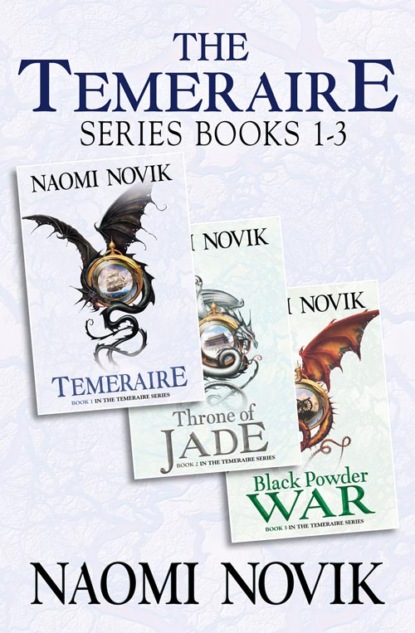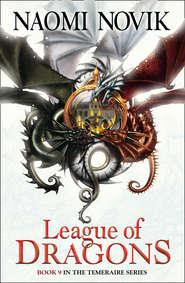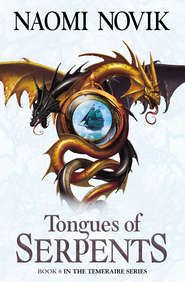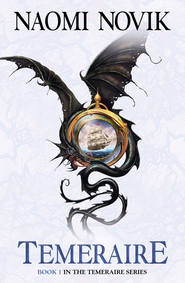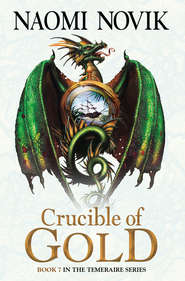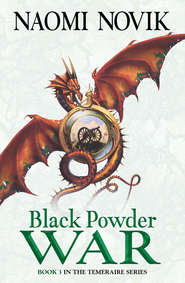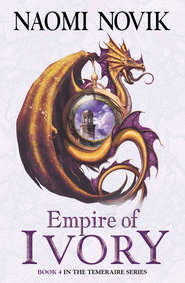По всем вопросам обращайтесь на: info@litportal.ru
(©) 2003-2024.
✖
The Temeraire Series Books 1-3: Temeraire, Throne of Jade, Black Powder War
Автор
Год написания книги
2018
Настройки чтения
Размер шрифта
Высота строк
Поля
Laurence cleared his throat; he was already standing, having ordered his desk and chair removed to make more room, though he had kept back his inkstand and pen with several sheets of paper, now resting upon the sill of the stern windows behind him. ‘Gentlemen,’ he said, ‘you have all heard by now that we found a dragon egg aboard the prize; Mr. Pollitt has very firmly identified it for us.’
Many smiles and some surreptitious elbowing; the little midshipman Battersea piped up in his treble voice, ‘Congratulations, sir!’ and a quick pleased rumble went around.
Laurence frowned; he understood their high spirits, and if the circumstances had been only a little different, he would have shared them. The egg would be worth a thousand times its weight in gold, brought safely to shore; every man aboard the ship would have shared in the bounty, and as captain he himself would have taken the largest share of the value.
The Amitié’s logs had been thrown overboard, but her hands had been less discreet than her officers, and Wells had learned enough from their complaints to explain the delay all too clearly. Fever among the crew, becalmed in the doldrums for the better part of a month, a leak in her water tanks leaving her on short water rations, and then at last the gale that they themselves had so recently weathered. It had been a string of exceptionally bad luck, and Laurence knew the superstitious souls of his men would quail at the idea that the Reliant was now carrying the egg that had undoubtedly been the cause of it.
He would certainly take care to keep that information from the crew, however; better by far that they not know of the long series of disasters which the Amitié had suffered. So after silence fell again, all Laurence said was simply, ‘Unfortunately, the prize had a very bad crossing of it. She must have expected to make landfall nearly a month ago, if not more, and the delay has made the circumstances surrounding the egg urgent.’ There was puzzlement and incomprehension now on most faces, though looks of concern were beginning to spread, and he finished the matter off by saying, ‘In short, gentlemen, it is about to hatch.’
Another low murmur, this time disappointed, and even a few quiet groans; ordinarily he would have marked the offenders for a mild later rebuke, but as it was, he let them by. They would soon have more cause to groan. So far they had not yet understood what it meant; they merely made the mental reduction of the bounty on an unhatched egg to that paid for a feral dragonet, much less valuable.
‘Perhaps not all of you are aware,’ he said, silencing the whispers with a look, ‘that England is in a very dire situation as regards the Aerial Corps. Naturally, our handling is superior, and the Corps can outfly any other nation of the world, but the French can outbreed us two to one, and it is impossible to deny that they have better variety in their bloodlines. A properly harnessed dragon is worth at least a first-rate of one hundred guns to us, even a common Yellow Reaper or a three-ton Winchester, and Mr. Pollitt believes from the size and colour of the egg that this hatchling is a prime specimen, and very likely one of the rare large breeds.’
‘Oh!’ said Midshipman Carver, in tones of horror, as he took Laurence’s meaning; he instantly went crimson as eyes went to him, and shut his mouth tight.
Laurence ignored the interruption; Riley would see Carver’s grog stopped for a week without having to be told. The exclamation had at least prepared the others. ‘We must at least make the attempt to harness the beast,’ he said. ‘I trust, gentlemen, that there is no man here who is not prepared to do his duty for England. The Corps may not be the sort of life that any of us has been raised to, but the Navy is no sinecure either, and there is not one of you who does not understand a hard service.’
‘Sir,’ said Lieutenant Fanshawe anxiously: he was a young man of very good family, and the son of an earl, ‘do you mean – that is, shall we all—’
There was an emphasis on that ‘all’ which made it obviously a selfish suggestion, and Laurence felt himself go near purple with anger. He snapped, ‘We all shall, indeed, Mr. Fanshawe, unless there is any man here who is too much of a coward to make the attempt, and in that case that gentleman may explain himself to a court martial when we put in at Madeira.’ He sent an angry glare around the room, and no one else met his eye or offered a protest.
He was all the more infuriated for understanding the sentiment, and for sharing it himself. Certainly no man not raised to the life could be easy at the prospect of suddenly becoming an aviator, and he loathed the necessity of asking his officers to face it. It meant, after all, an end to any semblance of ordinary life. It was not like sailing, where you might hand your ship back to the Navy and be set ashore, often whether you liked it or not.
Even in times of peace, a dragon could not be put into dock, nor allowed to wander loose, and to keep a full-grown beast of nine or ten tons from doing exactly as it pleased took very nearly the full attention of an aviator and a crew of assistants besides. They could not really be managed by force, and were finicky about their handlers; some would not accept management at all, even when new-hatched, and none would accept it after their first feeding. A feral dragon could be kept in the breeding-grounds by the constant provision of food, mates, and comfortable shelter, but they could not be controlled outside, and they would not speak with men.
So if a hatchling let you put it into harness, duty forever after tied you to the beast. An aviator could not easily manage any sort of estate, nor raise a family, nor go into society to any real extent. They lived as men apart, and largely outside the law, for you could not punish an aviator without losing the use of his dragon. In peacetime they lived in a sort of wild, outrageous libertinage in small enclaves, generally in the most remote and inhospitable places in all Britain, where the dragons could be given at least some freedom. Though the men of the Corps were honoured without question for their courage and devotion to duty, the prospect of entering their ranks could not be appealing to any gentleman raised up in respectable society.
Yet they sprang from good families, gentlemen’s sons handed over at the age of seven to be raised to the life, and it would be an impossible insult to the Corps to have anyone other than one of his own officers attempt the harnessing. And if one had to be asked to take the risk, then all; though if Fanshawe had not spoken in so unbecoming a way, Laurence would have liked to keep Carver out of it, as he knew the boy had a poor head for heights, which struck him as a grave impediment for an aviator. But in the atmosphere created by the pitiful request, it would seem like favouritism, and that would not do.
He took a deep breath, still simmering with anger, and spoke again. ‘No man here has any training for the task, and the only fair means of assigning the duty is by lot. Naturally, those gentlemen with family are excused. Mr. Pollitt,’ he said, turning to the surgeon, who had a wife and four children in Derbyshire, ‘I hope that you will draw the name for us. Gentlemen, you will each write your name upon a sheet here, and cast it into this bag.’ He suited word to deed, tore off the part of the sheet with his name, folded it and put it into the small sack.
Riley stepped forward at once, and the others followed suit obediently; under Laurence’s cold eye, Fanshawe flushed and wrote his name with a shaking hand. Carver, on the other hand, wrote bravely, though with a pale cheek; and at the last Battersea, unlike virtually all the others, was incautious in tearing the sheet, so that his piece was unusually large; he could be heard murmuring quietly to Carver, ‘Would it not be famous to ride a dragon?’
Laurence shook his head a little at the thoughtlessness of youth; yet it might indeed be better were one of the younger men chosen, for the adjustment would be easier. Still, it would be hard to see one of the boys sacrificed to the task, and to face the outrage of their families. But the same would be true of any man here, including himself.
Though he had done his best not to consider the consequences from a selfish perspective, now that the fatal moment was at hand he could not entirely suppress his own private fears. One small bit of paper might mean the wreck of his career, the upheaval of his life, disgrace in his father’s eyes. And, too, there was Edith Galman to think of; but if he were to begin excusing his men for some half-formed attachment, not binding, none of them would be left. In any case, he could not imagine excusing himself from this selection for any reason: this was not something he could ask his men to face, and avoid himself.
He handed the bag to Mr. Pollitt and made an effort to stand at his ease and appear unconcerned, clasping his hands loosely behind his back. The surgeon shook the sack in his hand twice, thrust his hand in without looking, and drew out a small folded sheet. Laurence was ashamed to feel a sensation of profound relief even before the name was read: the sheet was folded over once more than his own entry had been.
The emotion lasted only a moment. ‘Jonathan Carver,’ Pollitt said. Fanshawe could be heard letting out an explosive breath, Battersea sighing, and Laurence bowed his head, silently cursing Fanshawe yet again; so promising a young officer, and so likely to be useless in the Corps.
‘Well; there we have it,’ he said; there was nothing else to be done. ‘Mr. Carver, you are relieved of regular duty until the hatching; you will instead consult with Mr. Pollitt on the process to follow for the harnessing.’
‘Yes, sir,’ the boy responded, a little faintly.
‘Dismissed, gentlemen; Mr. Fanshawe, a word with you. Mr. Riley, you have the deck.’
Riley touched his hat, and the others filed out behind him. Fanshawe stood rigid and pale, hands clasped behind his back, and swallowed; his Adam’s apple was prominent and bobbed visibly. Laurence made him wait sweating until his steward had restored the cabin furniture, and then seated himself and glared at him from this position of state, enthroned before the stern windows.
‘Now then, I should like you to explain precisely what you meant by that remark earlier, Mr. Fanshawe,’ he said.
‘Oh, sir, I didn’t mean anything,’ Fanshawe said. ‘It is only what they say about aviators, sir—’ He stumbled to a stop under the increasingly militant gleam in Laurence’s eye.
‘I do not give a damn what they say, Mr. Fanshawe,’ he said, icily. ‘England’s aviators are her shield from the air, as the Navy is by sea, and when you have done half as much as the least of them, you may offer criticism. You will stand Mr. Carver’s watch and do his work as well as your own, and your grog is stopped until further notice: inform the quartermaster. Dismissed.’
But despite his words, he paced the cabin after Fanshawe had gone. He had been severe, and rightly so, for it was very unbecoming in the fellow to speak in such a way, and even more to hint that he might be excused for his birth. But it was certainly a sacrifice, and his conscience smote him painfully when he thought of the look on Carver’s face. His own continued feelings of relief reproached him; he was condemning the boy to a fate he had not wanted to face himself.
He tried to comfort himself with the notion that there was every chance that the dragon would turn its nose up at Carver, untrained as he was, and refuse the harness. Then no possible reproach could be made, and he could deliver it for the bounty with an easy conscience. Even if it could only be used for breeding, the dragon would still do England a great deal of good, and taking it away from the French was a victory all on its own; personally he would be more than content with that as a resolution, though as a matter of duty he meant to do everything in his power to make the other occur.
The next week passed uncomfortably. It was impossible not to perceive Carver’s anxiety, especially as the week wore on and the armourer’s attempt at the harness began to take on a recognizable shape, or the unhappiness of his friends and the men of his gun crew, for he was a popular fellow, and his difficulty with heights was no great secret.
Mr. Pollitt was the only one in good humour, being not very well informed as to the state of the emotions on the ship, and very interested in the harnessing process. He spent a great deal of time inspecting the egg, going so far as to sleep and eat beside the crate in the gunroom, much to the distress of the officers who slept there: his snores were penetrating, and their berth was already crowded. Pollitt was entirely unconscious of their silent disapproval, and he kept his vigil until the morning when, with a wretched lack of sympathy, he cheerfully announced that the first cracks had begun to show.
Laurence at once ordered the egg uncrated and brought up on deck. A special cushion had been made for it, out of old sailcloth stuffed with straw; this was placed on a couple of lockers lashed together, and the egg gingerly laid upon it. Mr. Rabson, the armourer, brought up the harness: it was a makeshift affair of leather straps held by dozens of buckles, as he had not known enough about the proportions of dragons to make it exact. He stood waiting with it, off to the side, while Carver positioned himself before the egg. Laurence ordered the hands to clear the space around the egg to leave more room; most of them chose to climb into the rigging or onto the roof of the roundhouse, the better to see the process.
It was a brilliantly sunny day, and perhaps the warmth and light was encouraging to the long-confined hatchling; the egg began to crack more seriously almost as soon as it was laid out. There was a great deal of fidgeting and noisy whispering up above, which Laurence chose to ignore, and a few gasps when the first glimpse of movement could be seen inside: a clawed wingtip poking out, talons scrabbling out of a different crack.
The end came abruptly: the shell broke almost straight down the middle and the two halves were flung apart onto the deck, as if by the occupant’s impatience. The dragonet was left amid bits and pieces, shaking itself out vigorously on the pillow. It was still covered with the slime of the interior, and shone wet and glossy under the sun; its body was a pure, untinted black from nose to tail, and a sigh of wonder ran around the crew as it unfurled its large, six-spined wings like a lady’s fan, the bottom edge dappled with oval markings in grey and dark glowing blue.
Laurence himself was impressed; he had never seen a hatchling before, though he had been at several fleet actions and witnessed the grown dragons of the Corps striking in support. He did not have the knowledge to identify the breed, but it was certainly an exceedingly rare one: he did not recall ever seeing a black dragon on either side, and it seemed quite large, for a fresh-hatched creature. That only made the matter more urgent. ‘Mr. Carver, when you are ready,’ he said.
Carver, very pale, stepped towards the creature, holding out his hand, which trembled visibly. ‘Good dragon,’ he said; the words sounded rather like a question. ‘Nice dragon.’
The dragonet paid him no attention whatsoever. It was occupied in examining itself and picking off bits of shell that had adhered to its hide, in a fastidious sort of way. Though it was barely the size of a large dog, the five talons upon each claw were still an inch long and impressive; Carver looked at them anxiously and stopped an arm’s length away. Here he stood waiting dumbly; the dragon continued to ignore him, and presently he cast an anxious look of appeal over his shoulder at where Laurence stood with Mr. Pollitt.
‘Perhaps if he were to speak to it again,’ Mr. Pollitt said, dubiously.
‘Pray do so, Mr. Carver,’ Laurence said.
The boy nodded, but even as he turned back, the dragonet forestalled him by climbing down from its cushion and leaping onto the deck past him. Carver turned around with hand still out stretched and an almost comical look of surprise, and the other officers, who had drawn closer in the excitement of the hatching, backed away in alarm.
‘Hold your positions,’ Laurence snapped. ‘Mr. Riley, look to the hold.’ Riley nodded and took up position in front of the opening, to prevent the dragonet’s going down below.
But the dragonet instead turned to exploring the deck; it flicked out a long, narrow forked tongue as it walked, lightly touching everything in its reach, and looked around itself with every evidence of curiosity and intelligence. Yet it continued to ignore Carver, despite the boy’s repeated attempts to catch its attention, and seemed equally un interested in the other officers. Though it did occasionally rear up onto its hind legs to peer at a face more closely, it did as much to examine a pulley, or the hanging hourglass, at which it batted curiously.
Laurence felt his heart sinking; no one could blame him, precisely, if the dragonet did not show any inclination for an untrained sea-officer, but to have a truly rare dragonet caught in the shell go feral would certainly feel like a blow. They had arranged the matter from common knowledge, bits and pieces out of Pollitt’s books, and from Pollitt’s own imperfect recollection of a hatching which he had once observed; now Laurence feared there was some essential step they had missed. It had certainly seemed strange to him that the dragonet should be able to begin talking at once, freshly hatched. They had not found anything in the texts describing any specific invitation or trick to induce the dragonet to speak, but he should certainly be blamed, and blame himself, if it turned out there had been something omitted.
A low buzz of conversation was spreading as the officers and hands felt the moment passing. Soon he would have to give it up and take thought to confining the beast, to keep it from flying off after they fed it. Still exploring, the dragon came past him; it sat up on its haunches to look at him inquisitively, and Laurence gazed down at it in unconcealed sorrow and dismay.
It blinked at him; he noticed its eyes were a deep blue and slit-pupilled, and then it said, ‘Why are you frowning?’
Silence fell at once, and it was only with difficulty that Laurence kept from gaping at the creature. Carver, who must have been thinking him self reprieved by now, was standing behind the dragon, mouth open; his eyes met Laurence’s with a desperate look, but he drew up his courage and stepped forward, ready to address the dragon once more.
Laurence stared at the dragon, at the pale, frightened boy, and then took a deep breath and said to the creature, ‘I beg your pardon, I did not mean to. My name is Will Laurence; and yours?’
No discipline could have prevented the murmur of shock which went around the deck. The dragonet did not seem to notice, but puzzled at the question for several moments, and finally said, with a dissatisfied air, ‘I do not have a name.’
Laurence had read over Pollitt’s books enough to know how he should answer; he asked, formally, ‘May I give you one?’





